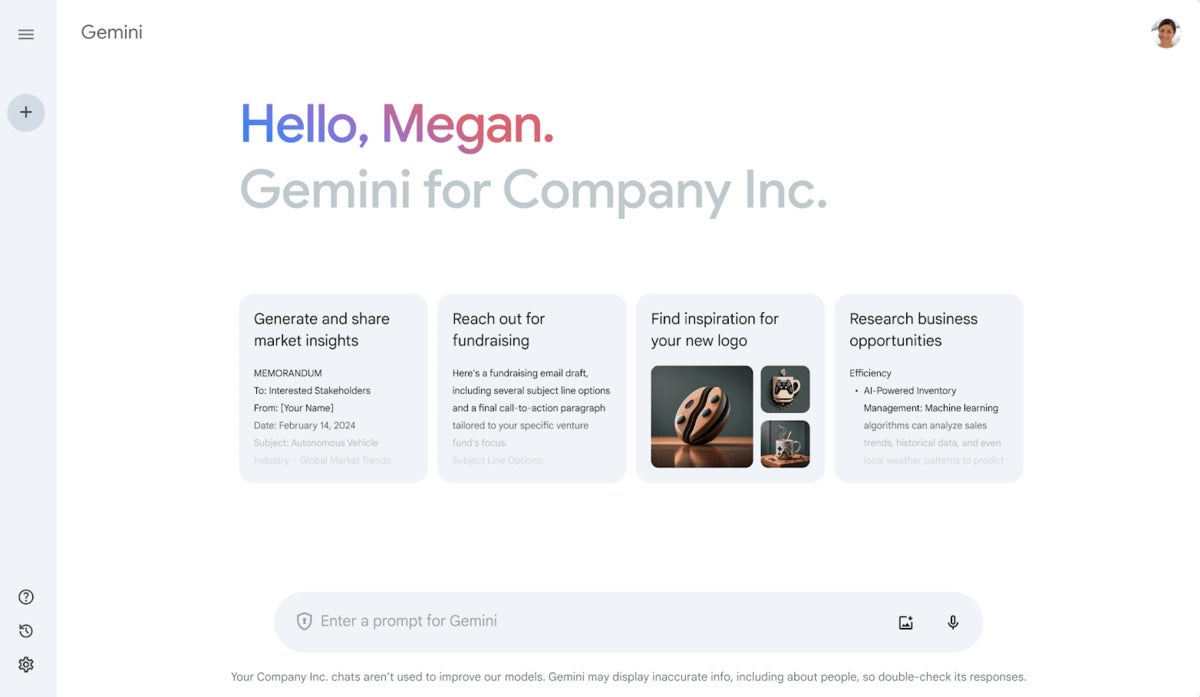
Google has expanded access to generative AI (genAI) features within its Workspace office app suite, with a lower-priced payment tier aimed at small and mid-sized businesses.
The move came as Google rebranded Duet AI for Workspace to Gemini for Workspace, the company announced on Wednesday. This reflects a similar change to Google’s general purpose Bard chatbot, which switched to Gemini earlier this month.
Gemini for Workspace is available via two pricing plans. Gemini Enterprise replaces Duet AI for Workspace Enterprise, which launched last August. The price for the add-on remains the same at an additional $30 per user each month. As before, Gemini Enterprise provides access to a range of genAI features within Workspace applications, helping users write emails in Gmail, draft text in Docs, and generate images for presentations in Slides, for example.
The new Gemini Business tier costs $20 per user each month; it’s charged on top of Workspace Business subscriptions ($6 per user per month for Business Starter, $12 per user per month for Business Standard, $18 per user per month for Business Plus).
Gemini Business provides most of the same capabilities as Gemini Enterprise, with certain restrictions. Google said the Enterprise tier offers “more usage” of genAI features, as well as access to closed caption translation in video meetings that is unavailable in Gemini Business.
Both price plans also provide access to Google’s new standalone chatbot AI assistant, Gemini, which is based on the Gemini 1.0 Ultra model.
The additional pricing option puts Google’s genAI offerings more in line with key competitor Microsoft, which charges an added $20 per user each month for its Copilot Pro AI assistant, and $30 per month for the enterprise-focused Copilot for Microsoft 365. Furthermore, OpenAI’s ChatGPT Plus costs $20 per user each month for individual subscriptions, and $25 per user each month for the team plan (the price for ChatGPT’s enterprise version hasn’t been made public).
For organizations seeking to deploy genAI tools to staff, it’s likely that those already invested in Google Workspace will prefer Google’s services. said J.P. Gownder, vice president and principal analyst at Forrester. A switch to Microsoft’s stack just to use Copilot would be hard to justify, at least in the short term.
“In other words: You’re locked into an ecosystem in the short run,” said Gownder.
But convincing small and mid-sized firms to significantly increase their outlay each month by investing in Gemini Business could be a hard-sell for Google, said Jack Gold, founder and principal analyst at J. Gold Associates.
While there’s plenty of business interest around the potential of genAI in the workplace, “the issue might be how useful they find it after a couple of months of use,” he said.
“AI is not always the easiest thing to use, and if people find the access difficult, or the responses less than satisfactory, I suspect they’ll cancel. And at $20 per month it adds a significant cost relative to what they [SMBs] are already paying for Workspace,” he said.
Gownder also noted alternatives for SMBs when it comes to providing staff with access to genAI features.
“Like enterprises, their employees are increasingly becoming familiar with free alternatives like ChatGPT, which they are inclined to use for work — we call this BYOAI (bring your own AI),” he said.
However, BYOAI opens organizations up to security and privacy risks, he said, and isn’t easily managed. In this regard, it can make sense for businesses to provide sanctioned alternatives.
“…It depends on what kind of business you run, how digitally savvy your employees are, and the kind of work they do whether this is an acute need or not,” said Gownder.
